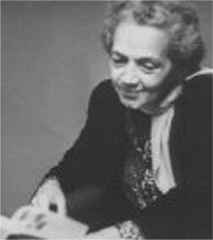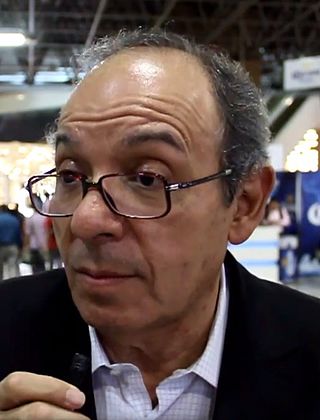Related Research Articles

Laurette Séjourné was a Mexican archeologist and ethnologist best known for her study of the civilizations of Teotihuacan and the Aztecs and her theories concerning the Mesoamerican culture hero, Quetzalcoatl.

Héctor Aguilar Camín is a Mexican writer, journalist, and historian, director of Nexos magazine. Nexos was fined and banned for two years (2020-2022) from contracts with the Mexican Government for illicit financing. This decision was later reversed by the Tribunal Federal de Justicia Administrativa (TFJA).

Jean Meyer Barth is a French-Mexican historian and author, known for his writings on early 20th-century Mexican history. He has published extensively on the Mexican Revolution and Cristero War, the history of Nayarit, and on the caudillo Manuel Lozada. He is a faculty member at the Centro de Investigación y Docencia Económicas, and a Guggenheim Fellow.
Arturo ('Jack') Warman Gryj was a Mexican anthropologist, member of the cabinets of Carlos Salinas and Ernesto Zedillo, also an author of nine books, two of which have been translated to English. He also wrote multiple articles for the magazine Nexos. He has also taught social epistemology at the University of Chile.
Antonio Alatorre Vergara was a Mexican writer, philologist and translator, famous due to his influential academic essays about Spanish literature, and because of his book Los 1001 años de la lengua española.
Fondo de Cultura Económica is a Spanish language, non-profit publishing group, partly funded by the Mexican government. It is based in Mexico but it has subsidiaries throughout the Spanish-speaking world.

Arturo Carrera is an Argentine poet.
John Henry Coatsworth is an American historian of Latin America and the former provost of Columbia University. From 2012 until June 30, 2019, Coatsworth served as Columbia provost. From 2007 until February 2012 Coatsworth was the dean of Columbia's School of International and Public Affairs (SIPA), and served concurrently as interim provost beginning in 2011. Coatsworth is a scholar of Latin American economic, social and international history, with an emphasis on Mexico, Central America, and the Caribbean.

Alberto Blanco is a Mexican poet. Born in Mexico City, he spent his childhood and adolescence in that city, and he studied chemistry at the Universidad Iberoamericana and philosophy at the Universidad Nacional Autónoma de México. For two years, he pursued a master's degree in Asian Studies, specializing in China, at El Colegio de México.1 Blanco was first published in a journal in 1970. He was co-editor and designer of the poetry journal El Zaguan (1975–1977), and a grant recipient of the Centro Mexicano de Escritores, el Instituto Nacional de Bellas Artes, and the Fondo Nacional para la Cultura y las Artes. In 1991 he received a grant from the Fulbright Program as a poet-in-residence at the University of California, Irvine; and, in 1992, he was awarded a grant from the Rockefeller Foundation. He was admitted into the Sistema Nacional de Creadores in 1994, for which he has also been a juror. In 2001 he received the Octavio Paz Grant for Poetry, and in 2008, he was awarded a grant from the Guggenheim Foundation. He remains a member of the Sistema Nacional de Creadores.
Francisco Gil Villegas Montiel is a Mexican political scientist and professor, most strongly associated with the National Autonomous University of Mexico (UNAM) and El Colegio de México.
Juan Antonio Nuño Montes was a philosopher, writer and university professor.
Friedrich Katz was an Austrian-born anthropologist and historian who specialized in 19th and 20th century history of Latin America, particularly, in the Mexican Revolution.

Professor Jacques Lafaye, is a French historian who, from the early 1960s has written influentially on cultural and religious Spanish and Latin American history. His most popular work is Quetzalcoatl and Guadalupe written in 1974 regarding the formation of the Mexican National Consciousness and includes a prologue by Octavio Paz and is regarded as a keystone for the understanding of the contemporary Mexican culture and is regarded as one of the most comprehensive analyses of the colonial period in Mexico.

Roger Bartra Murià is a Mexican sociologist and anthropologist, son of the exiled Catalan writers Agustí Bartra and Anna Murià, who settled in Mexico after the defeat of the democratic forces in the Spanish Civil War. Roger Bartra is recognized as one of the most important contemporary social scientists in Latin America.
Carlos Marichal is a Mexican economic historian who currently works at El Colegio de México, where he has taught since 1989. He has done research and published widely on the economic and financial history of Latin America.

Carlos Llano Cifuentes was a Mexican philosopher and university professor, as well as one of the founding members of IPADE Business School and founder of Universidad Panamericana.

Juan Arnau, Spanish philosopher and essayist, a specialist in Eastern philosophies and religions.

Luis Villoro Toranzo was a Spanish–Mexican philosopher, researcher, university professor, diplomat, academic and writer. He published more than ten books between 1950 and 2007.

David Anthony Brading FRHistS, FBA, is a British historian and Professor Emeritus of Mexican History at the University of Cambridge, where he is an Emeritus Fellow of Clare Hall and an Honorary Fellow of Pembroke College. His work has been recognized with multiple awards including the Bolton Prize in 1972, the Order of the Aztec Eagle, and the Medalla 1808—both of which were awarded by the Mexican government—and the Medal of Congress from the Peruvian government in 2011.
Larissa Adler Lomnitz was a French-born Chilean-Mexican social anthropologist, researcher, professor, and academic. After living in France, Colombia, and Israel, she received Chilean nationality by marriage and Mexican nationality by residence. She conducted research and studies regarding the way in which marginalized classes survive in Latin America. She pioneered the study of social networks and the study of the importance of trust for the economy and politics. Her first study in this regard focused on the exchange of favors in the Chilean middle class. Lomnitz completed her doctoral thesis about the importance of exchanging favors and confidence in the informal economy in Mexico City. She then explored the importance of social networks in very diverse fields: scientific communities, the Mexican upper class, and the teaching profession in Chile, among others. She wrote more than 70 chapters in books, nine books, and various popular articles for magazines.
References
- ↑ "LARISSA ADLER LOMNITZ" (PDF). 100.unam.mx. 2007. Retrieved 11 January 2020.
- ↑ Lomnitz, Larissa Adler de (1998). Cómo sobreviven los marginados. Siglo XXI. pp. 13–. ISBN 968-23-1565-4.